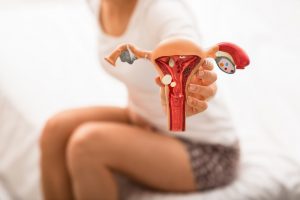Approximately 196 million women worldwide suffer from endometriosis, a condition that causes abdominal pain and can affect female fertility. It occurs when the lining of the uterus begins to overgrow and spread to other organs. Menstrual cycle disorders, abdominal pain, exhaustion and other complaints can be the result. Despite decades of research, little is known about the factors that contribute to the development of endometriosis.
According to new research, there is evidence that the microbiome, a community of microorganisms that live in the body, is altered in women with endometriosis. In this study, published in the journal Cell Death & Discovery, researchers from Baylor College of Medicine discovered that an altered gut microbiome plays a critical role in the progression of endometriosis disease in an animal model.
How Gut Bacteria Accelerate Endometriosis

The team also discovered a novel signature of microbiome-derived metabolites, microbial-produced products, that were significantly altered in the feces of mice with endometriosis. Supporting the role of microbiome metabolites in disease progression, Kommagani and his colleagues found that treating endometriotic cells and mice with the metabolite called quinic acid significantly enhanced cell proliferation, or endometriotic lesion growth. The results suggest that certain microbiome communities and/or their metabolites may contribute to endometriosis progression, and that altering the composition of these communities may help control the condition in human patients.
The results also suggested that examining microbiome metabolites in human stool samples could be used as a diagnostic tool. Endometriosis is usually diagnosed using ultrasound, and an invasive procedure is necessary to properly characterize the lesion. Scientists are investigating whether microbiome metabolites in human stool samples could be a useful diagnostic tool, and whether some of these metabolites could also be used as a treatment strategy. Women with endometriosis are also tend to gut problems such as colitis or inflammatory bowel syndrome.
Women With PCOS Have a Less Diverse Gut Microbiome
Other research suggests the importance of gut microbes in PCOS symptoms. According to a study in mice, exposure to healthy gut bacteria improved symptoms of polycystic ovary syndrome. This study, led by Varykina Thackray, Ph.D., of the University of California San Diego School of Medicine at La Jolla, builds on recent research by the same researchers showing that the human gut microbiome, or composition of the gut bacteria, contributes women with PCOS is less diverse.
PCOS affects about 10 percent of all women of childbearing age, the exact causes are still not fully understood. There is no cure, but symptoms can be improved with medication, dietary changes, and exercise. Signs of the disorder include cysts in the ovaries, higher testosterone levels, excessive body hair, irregular or no periods, and sometimes weight gain and insulin resistance. Possible long-term health consequences include infertility, miscarriage, pregnancy complications, type 2 diabetes, high blood pressure and depression.
Thackray and her research team induced PCOS in female mice going through puberty by giving them letrozole, an aromatase inhibitor. By blocking the conversion of testosterone to estrogen, this drug leads to elevated levels of testosterone and other hallmarks of PCOS in mice. Another control group of mice received a placebo treatment in this study, which was funded by the National Institutes of Child Health and Human Development. For five weeks, the researchers housed two mice per cage in three different housing arrangements: PCOS mice together, placebo-treated mice together, and mice from both treatment groups together. Being kept together leaves them exposed to each other’s gut microbiome.
PCOS mice living with placebo-treated mice had significantly improved testosterone levels, normalized cycles and more normal ovulation compared to PCOS mice kept together, the researchers reported. In addition, PCOS mice housed with placebo mice had lower weight, lower fasting blood glucose and insulin levels, as well as lower insulin resistance. The results suggest that altering the gut microbiome through prebiotic or probiotic therapies could be a potential treatment option for women with PCOS.





